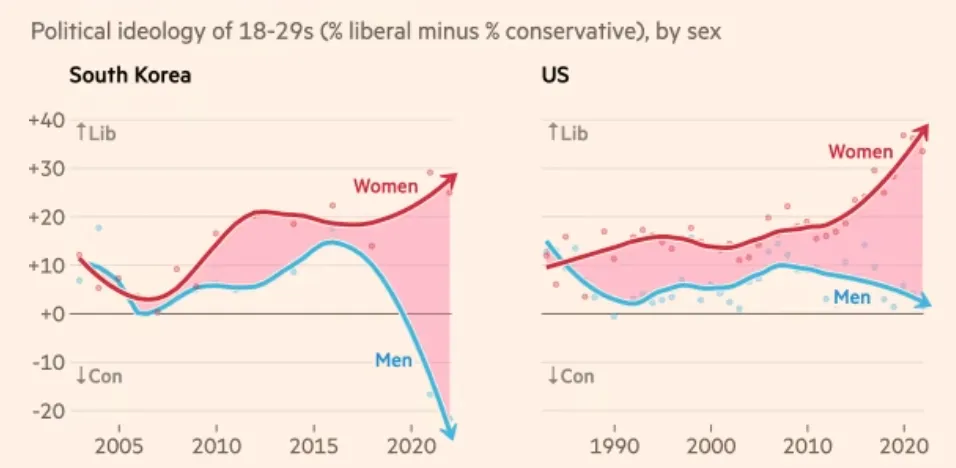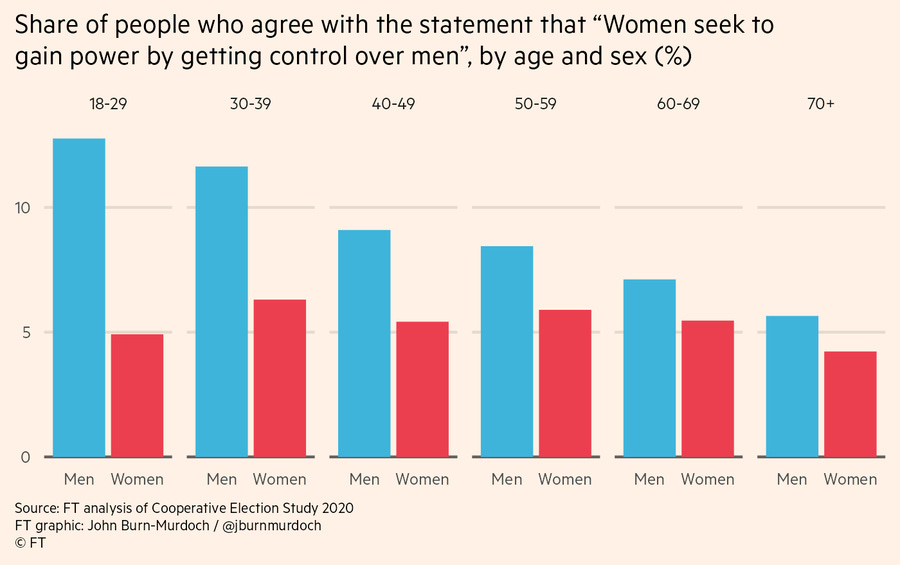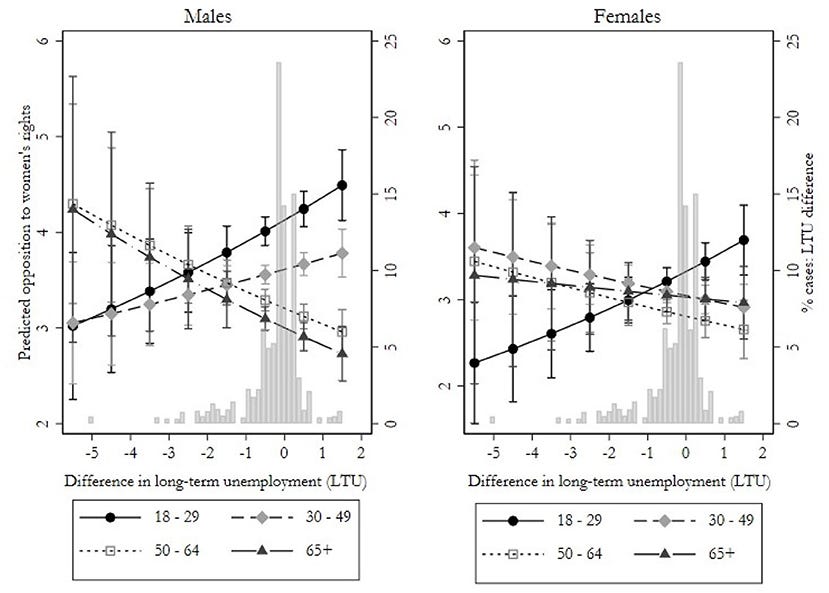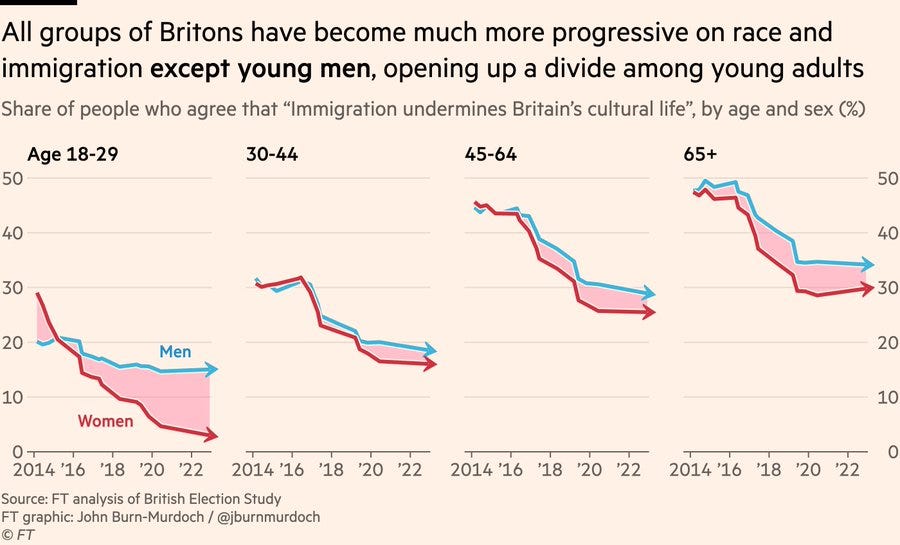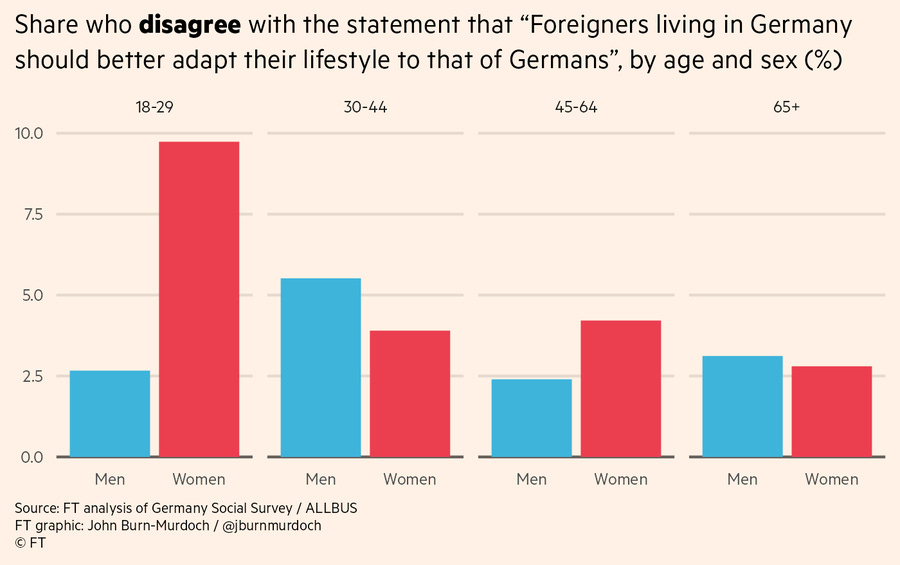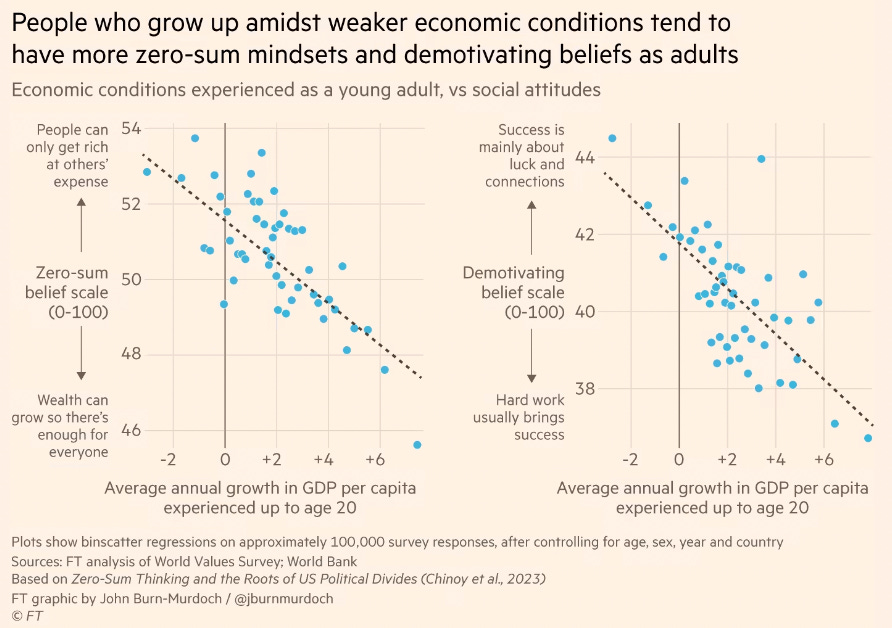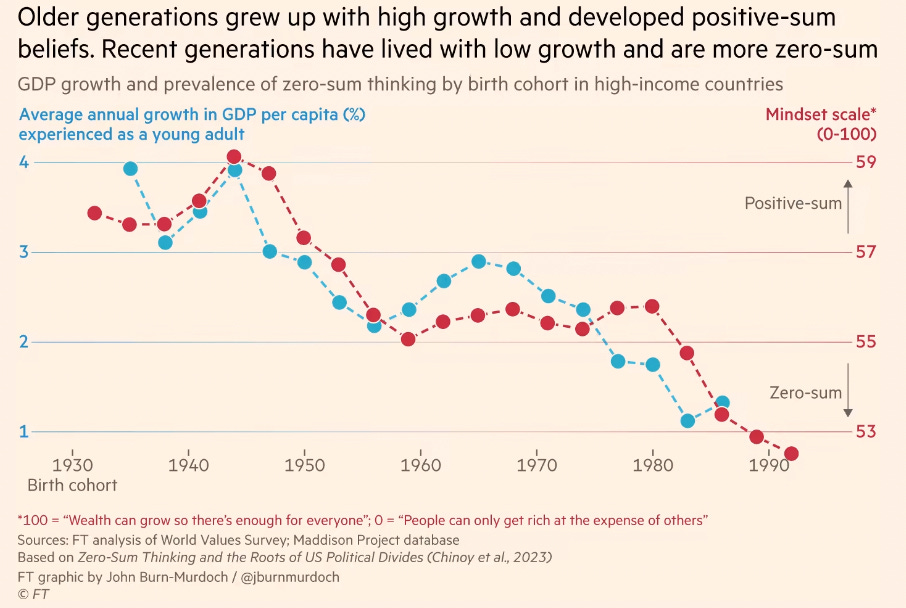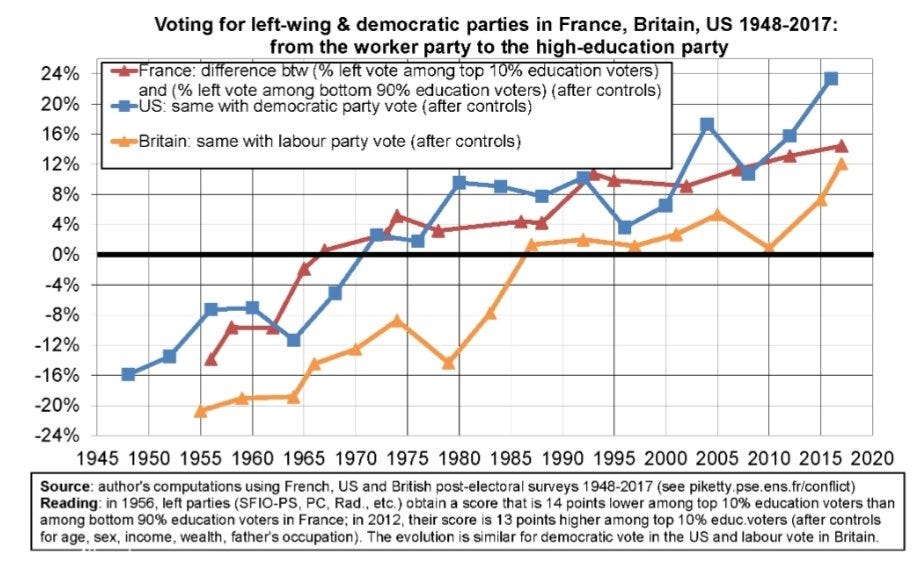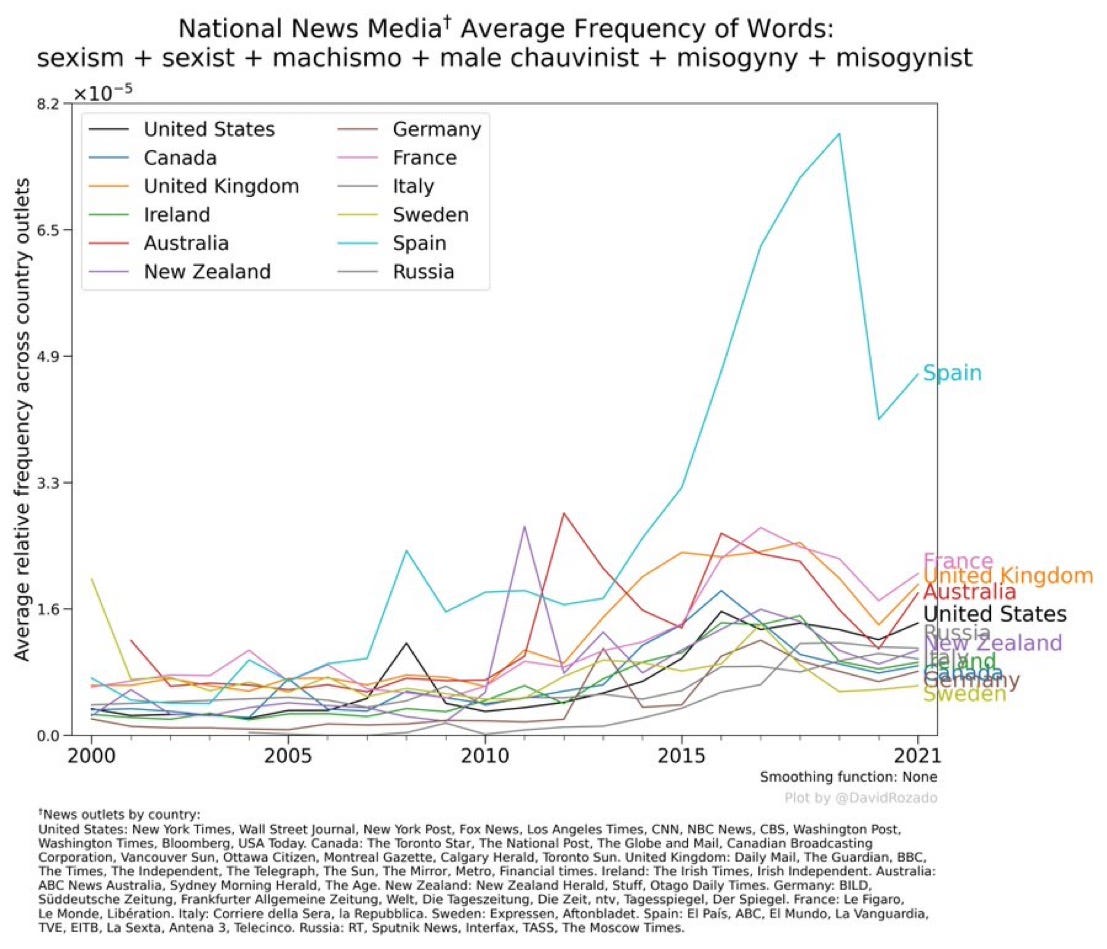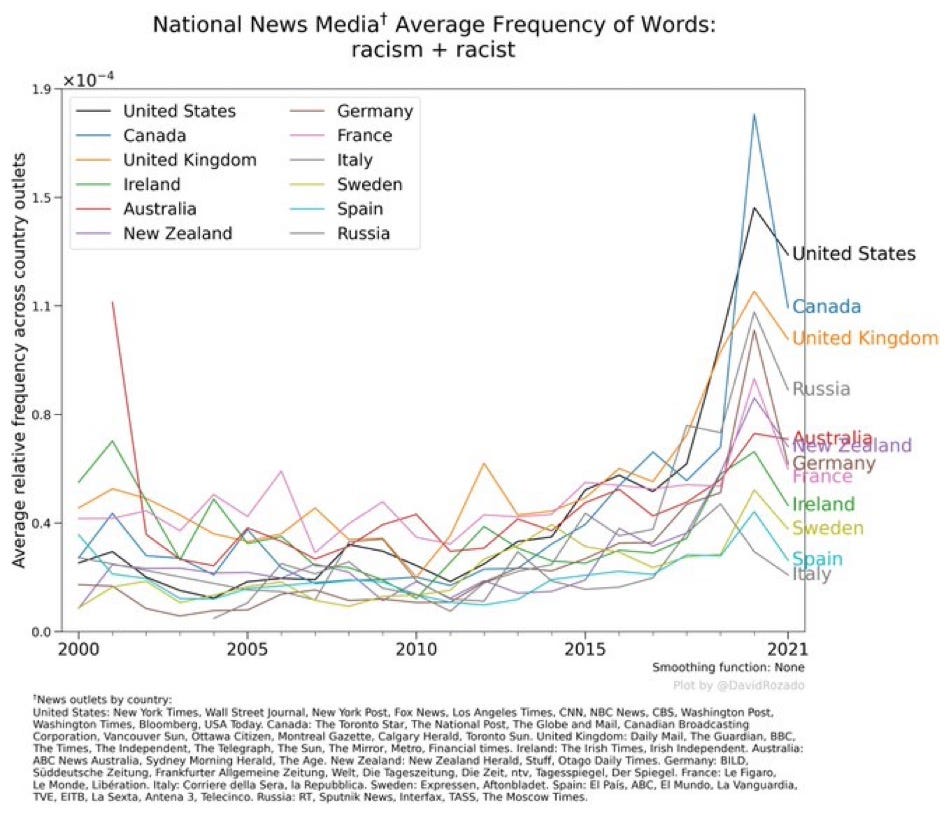ogc163
Superstar
Across much of the world, men and women think alike. However, in countries that are economically developed and culturally liberal, young men and women are polarising. As chronicled by John Burn-Murdoch, young women are increasingly likely to identify as ‘progressives’ and vote for leftists, while young men remain more conservative. What explains this global heterogeneity?
I suggest,
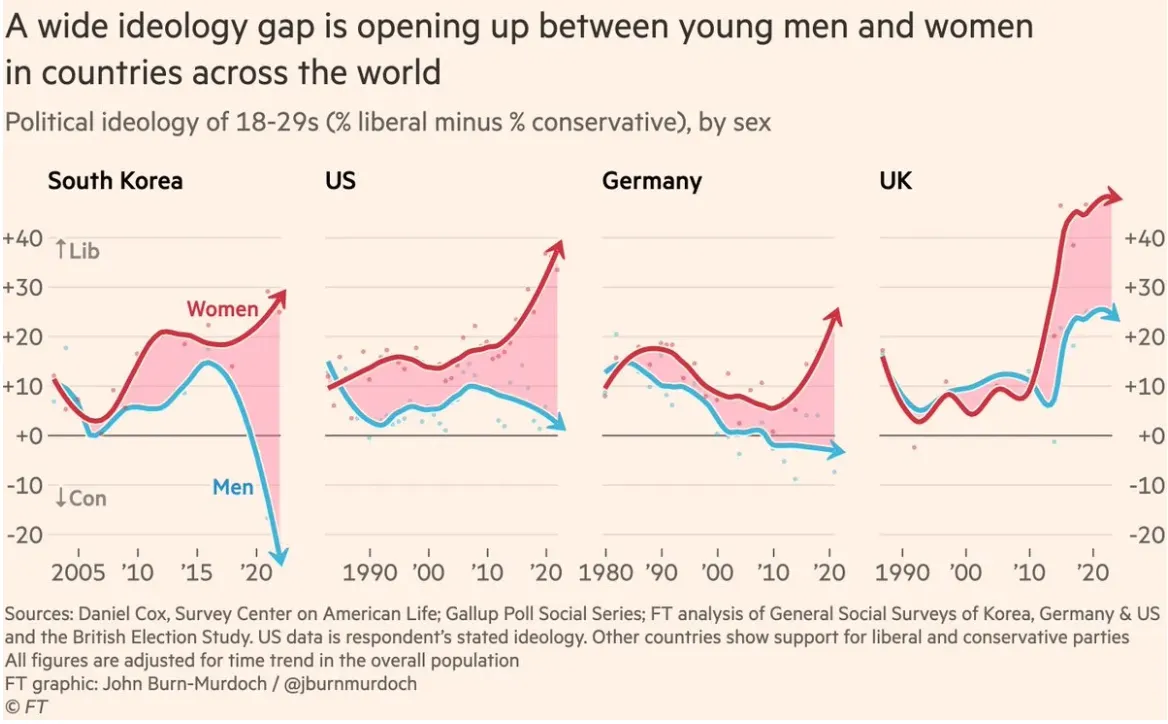
1) What suppresses a gender divide?
a) Close-knit, interdependent, religious communities encourage conformity
In poorer communities, people lack the security of salaries and social insurance. They are perched on a cliff edge of precarity - ever vulnerable to negative shocks from ill-health, injury, job-loss, and climate breakdown. Where nepotism is rife and rule of law is weak, it’s imperative to have allies. Distrusting outsiders, many prefer to do business with kin. Families stick together - not just in terms of commerce and cooperation, but also leisure and socialising.
If children are socialised to put family first, then remain reliant on close-knit networks, beholden to uniform social policing, there is little scope for polarisation. Deviance is sternly punished, since people either believe it is morally improper or risks social censure. Let me illustrate with examples from Morocco, India, Turkey and Canada.

Morocco
During Ramadan, my friend and I were shopping for iftar (the feast eaten after sunset). Walking through the crowded medina, all the dates looked the same. I wondered why we were trekking so far? Layla explained,

India
Thanks to economic growth, millions of Indian women have become educated, curious, and proud of their achievements. But their aspirations are often curtailed. India is caught in what I call “The Patrilocal Trap”. Since caste networks are paramount and ostracism is enormously costly, daughters are socialised to marry, please their in-laws and stay put.
Privately, many Indian women desperately seek a loving, respectful husband like Shah Rukh Khan. Shrayana Bhattacharya explains this brilliantly,
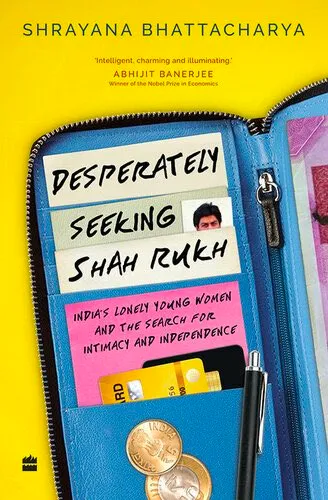
Turkey
In Konya, I spent a week with a very pious family. Her father had a splendid library of religious books and she was veiled. Together, we interviewed their imam and the leading Sufi Sheikh. Everyone was reading the same Quran, respecting the same scholars. There was no debate over scripture, nor difference of opinion.
One day, we went to lunch gathering. Zehra had recently married into the family and was now spending everyday with her mother-in-law. She had no independent work or social life; she spent all day with housewives in their 50s. Three months into marriage, Zehra was bored and unhappy. But she wasn’t resisting. That was life.
I suggest,
- Men and women tend to think alike in societies where there is
- Close-knit interdependence, religosity and authoritarianism, or
- Common culture and mixed gendered offline socialising.
- Gendered ideological polarisation appears encouraged by:
- Feminised public culture
- Economic resentment
- Social media filter bubbles
- Cultural entrepreneurs.

1) What suppresses a gender divide?
a) Close-knit, interdependent, religious communities encourage conformity
In poorer communities, people lack the security of salaries and social insurance. They are perched on a cliff edge of precarity - ever vulnerable to negative shocks from ill-health, injury, job-loss, and climate breakdown. Where nepotism is rife and rule of law is weak, it’s imperative to have allies. Distrusting outsiders, many prefer to do business with kin. Families stick together - not just in terms of commerce and cooperation, but also leisure and socialising.If children are socialised to put family first, then remain reliant on close-knit networks, beholden to uniform social policing, there is little scope for polarisation. Deviance is sternly punished, since people either believe it is morally improper or risks social censure. Let me illustrate with examples from Morocco, India, Turkey and Canada.

Morocco
During Ramadan, my friend and I were shopping for iftar (the feast eaten after sunset). Walking through the crowded medina, all the dates looked the same. I wondered why we were trekking so far? Layla explained,Strong family bonds were crucial, especially when her father had struggled economically. But they also created restrictions. Layla confided in me that she had previously loved women, but cut off contact because “It’s against the religion”. When she started dressing like a tomboy, her father was furious. In socially conservative Fes, there are strong penalties for being openly gay. Only when she migrated alone for work in Dubai could she finally embrace her desires. On Instagram, she posts butch selfies. Another friend (Salma) was part of a secret atheist group on Facebook, and drank water on our hike to Borj Sud during Ramadan, but this was all done covertly. Both women publicly conformed for fear of social disapproval, enforced by their parents.“We buy from our cousin, because they’re trustworthy”.

India
Thanks to economic growth, millions of Indian women have become educated, curious, and proud of their achievements. But their aspirations are often curtailed. India is caught in what I call “The Patrilocal Trap”. Since caste networks are paramount and ostracism is enormously costly, daughters are socialised to marry, please their in-laws and stay put.Privately, many Indian women desperately seek a loving, respectful husband like Shah Rukh Khan. Shrayana Bhattacharya explains this brilliantly,
One Indian woman is quoted as saying,“Most of us are expected to couple up early. So you smile and suffer through the mounting indignities.. A man with multiple failed businesses laughs at his date’s successful ventures. Dating in Delhi feels like an incessant confrontation with one’s worst insecurities”.
Shah Rukh Khan is enormously popular, argues Bhattacharya, because he embodies a masculinity that many Indian women desire, yet struggle to find. As women remark,“Maryada means self-discipline.. never express desire, never buy things for yourself”.
Just like Morocco, close-knit kinship and social policing reinforce conformity, preventing women from bucking out.“We’d never seen a man talk to women with such respect and love (izzat aur pyaar se), never seen a man pay this kind of attention (dhyaan) to a woman”
“In real life, there is no Shah Rukh. All men are like Salman. Women have to fight with tradition and have to accept losing the fight”.

Turkey
In Konya, I spent a week with a very pious family. Her father had a splendid library of religious books and she was veiled. Together, we interviewed their imam and the leading Sufi Sheikh. Everyone was reading the same Quran, respecting the same scholars. There was no debate over scripture, nor difference of opinion.One day, we went to lunch gathering. Zehra had recently married into the family and was now spending everyday with her mother-in-law. She had no independent work or social life; she spent all day with housewives in their 50s. Three months into marriage, Zehra was bored and unhappy. But she wasn’t resisting. That was life.





